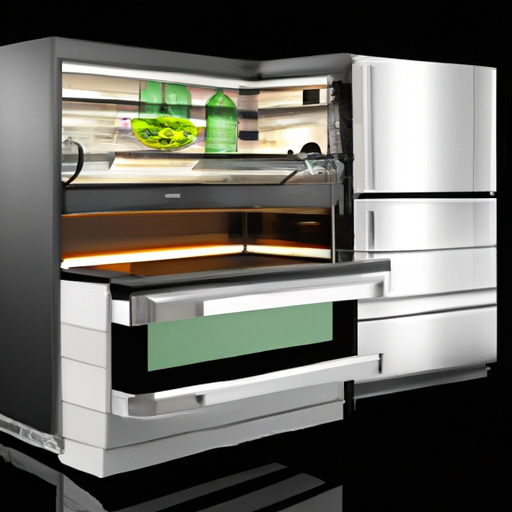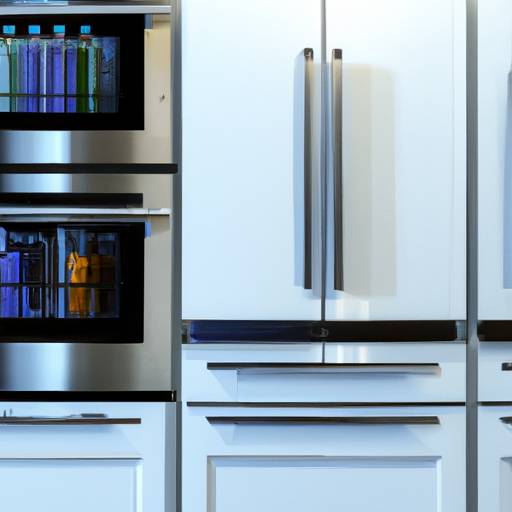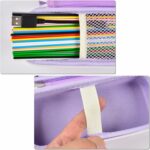Imagine a kitchen that knows what you want to cook even before you do. A kitchen that can guide you through each step of a recipe, adjust cooking times and temperatures automatically, and even suggest alternative ingredients based on what you have in your pantry. This is the future of cooking with Recipe Revolution: Cooking in a Smart Kitchen. With its innovative technology and user-friendly interface, this groundbreaking product is set to transform the way we cook and revolutionize our culinary experiences. Get ready to take your cooking skills to the next level with Recipe Revolution: Cooking in a Smart Kitchen.
Benefits of Cooking in a Smart Kitchen
Convenience
Cooking in a smart kitchen offers unparalleled convenience. With smart appliances, you can control and monitor your kitchen from anywhere in the house or even when you’re away. Imagine preheating your smart oven on your way home, so you can start cooking as soon as you step through the door. Smart kitchens also allow you to automate certain tasks, such as setting timers or adjusting cooking temperatures, saving you valuable time and effort.
Efficiency
Smart kitchens are designed to streamline your cooking process, making it more efficient. With features like recipe recommendations and ingredient substitutions, you can quickly find the right combinations for your meals, even if you’re missing a few ingredients. Additionally, smart appliances are equipped with timed cooking and multi-cooking modes, ensuring your food is cooked to perfection every time.
Healthier Cooking
A smart kitchen can help you make healthier food choices. Many smart appliances are equipped with nutritional information databases, allowing you to easily access the calorie and nutrient content of your meals. With this information at your fingertips, you can make informed decisions about what you eat and monitor your dietary goals more effectively.
Reduced Food Waste
Food waste is a major global issue, but a smart kitchen can help combat it. Smart refrigerators are equipped with inventory management features that track the expiration dates of your groceries and send you notifications when items are about to spoil. This enables you to use up your ingredients before they go bad, reducing waste and saving you money in the process.
Essential Smart Kitchen Appliances
Smart Refrigerator
A smart refrigerator is the heart of a smart kitchen. It goes beyond simply keeping your food cold; it can track inventory, suggest recipes based on the ingredients you have, and even place online grocery orders for you. Some models even have built-in cameras that allow you to see the contents of your fridge from your smartphone, so you know what you need to buy while at the grocery store.
Smart Oven
Gone are the days of guesswork when it comes to cooking in the oven. A smart oven takes the hassle out of cooking by offering pre-programmed cooking modes specific to different types of food. Whether you’re baking, roasting, or broiling, a smart oven can automatically adjust the temperature and cooking time for optimal results. Some models even have built-in meat thermometers to ensure your proteins are cooked to the desired doneness.
Smart Cooktop
Cooktops are no longer just a basic heat source. Smart cooktops come with advanced features such as induction cooking, which heats up your pots and pans directly instead of the cooktop surface. They also offer precise temperature control, allowing you to simmer, sauté, and boil with ease. Some models even have integrated sensors that can detect the size and shape of your cookware, adjusting the heat accordingly for even cooking.
Smart Coffee Maker
For coffee lovers, a smart coffee maker is a game-changer. You can easily schedule your coffee to brew at a specific time, so you wake up to the aroma of freshly brewed coffee. Some models even have built-in grinders, allowing you to use freshly ground beans for the ultimate coffee experience. With voice control capabilities, you can simply say, “Alexa, make me a cup of coffee,” and your smart coffee maker will do the rest.
Smart Blender
Smoothies, sauces, and soups are a breeze with a smart blender. These versatile appliances come with pre-set blending programs, taking the guesswork out of achieving the desired consistency. Some models even have Wi-Fi connectivity, enabling you to control the blender remotely through a mobile app. Whether you want a chunky salsa or a silky smooth puree, a smart blender can deliver consistent results every time.
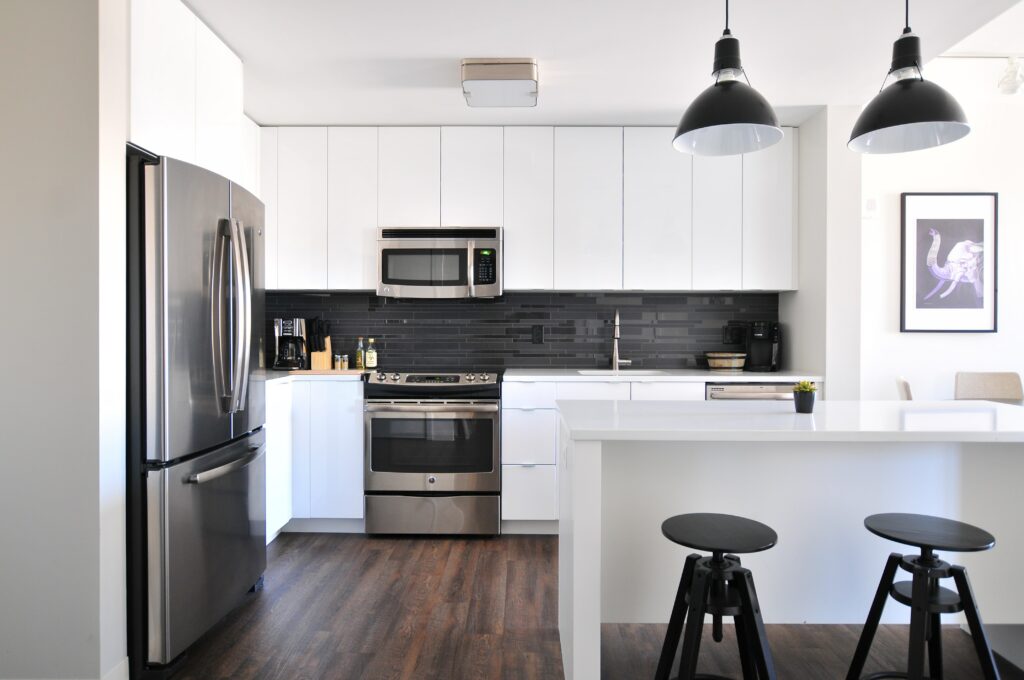
Connecting Your Smart Kitchen
Smart Home Integration
One of the key advantages of a smart kitchen is its ability to integrate seamlessly with other smart devices in your home. By connecting your smart kitchen appliances to a central hub, such as a smart speaker or a smart display, you can control and monitor all your devices from a single interface. This integration allows for a truly connected kitchen experience, where your appliances work together to make your cooking process more efficient.
Voice Control
Voice control is changing the way we interact with our smart kitchens. With voice assistants like Alexa and Google Assistant, you can simply speak commands to control your appliances. Whether you want to preheat your oven, blend a smoothie, or check the contents of your fridge, you can do it all hands-free. Voice control not only adds an extra layer of convenience but also provides assistance for those with mobility issues or disabilities.
Mobile Applications
Most smart appliances come with dedicated mobile applications that allow you to control and monitor them from your smartphone or tablet. These apps provide a user-friendly interface where you can adjust settings, view notifications, and access additional features. Whether you’re in the kitchen or out and about, having control over your smart appliances in the palm of your hand gives you the freedom to manage your cooking from anywhere.
Remote Access
The ability to access your smart kitchen remotely adds another level of convenience to your cooking experience. With remote access, you can start preheating your oven on your way home, check if you have all the ingredients for a recipe while at the grocery store, or monitor your slow cooker’s progress from your office. Being able to control and monitor your smart appliances even when you’re not physically present in the kitchen ensures that you’re always in control of your cooking.
Smart Kitchen Features and Functions
Recipe Recommendations
Smart kitchen appliances are designed to take the guesswork out of cooking. With recipe recommendation features, your smart appliances can suggest dishes based on the ingredients you have on hand. No more staring at a bare pantry and wondering what to cook – simply input the ingredients you have, and your smart kitchen will suggest mouthwatering recipes for you to try.
Ingredient Substitutions
Don’t have a specific ingredient for a recipe? No problem. Smart kitchens can offer ingredient substitution suggestions to help you adapt your recipes based on what you have available. Whether it’s substituting oil with applesauce or using yogurt instead of sour cream, your smart appliances can guide you through the process of finding suitable alternatives.
Nutritional Information
Maintaining a healthy diet is easier with the nutritional information provided by smart kitchen appliances. These appliances are equipped with extensive databases that provide accurate calorie and nutrient content for thousands of recipes. By having access to this information, you can make informed choices about your meals and keep track of your nutritional goals.
Timed Cooking
Timed cooking is a feature that allows you to set a specific start time and duration for your cooking. This means you can prep your meal in advance, set the cooking time, and have your food ready when you are. Whether you’re a busy professional juggling multiple tasks or a parent trying to coordinate dinner amidst a hectic schedule, timed cooking ensures that your meals are cooked to perfection, even when you’re pressed for time.
Multi-Cooking Modes
Smart appliances often come with multiple cooking modes, catering to a wide range of culinary needs. From baking and roasting to grilling and steaming, these versatile appliances can handle it all. Multi-cooking modes offer flexibility in the kitchen, allowing you to experiment with different cooking techniques and expand your culinary repertoire.
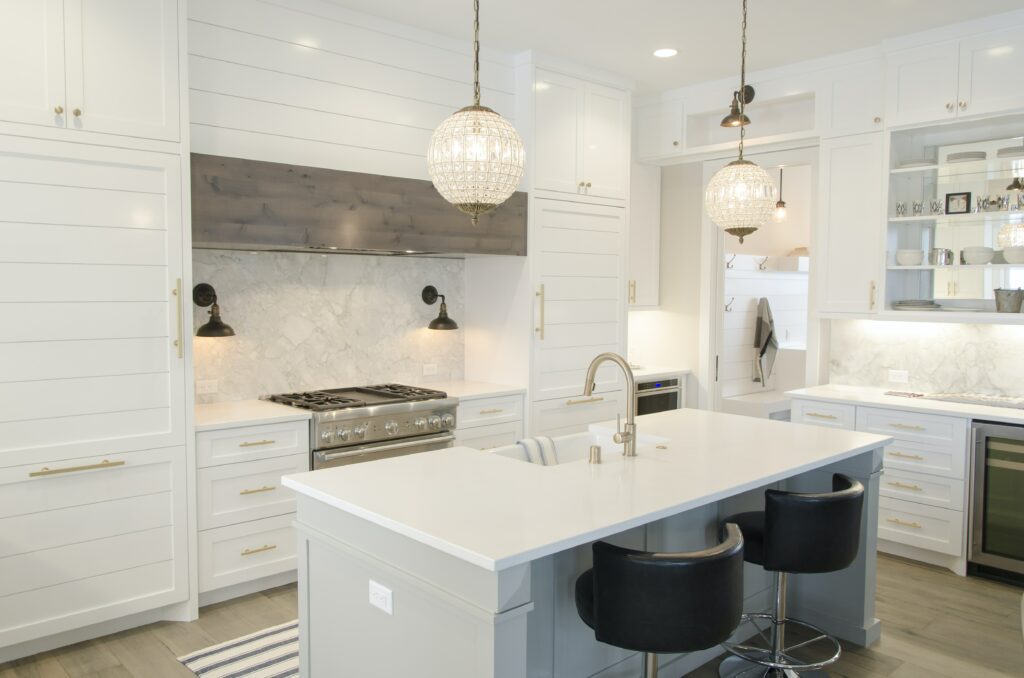
Building Your Smart Kitchen
Choosing the Right Appliances
When building your smart kitchen, it’s important to choose the right appliances that suit your cooking needs and preferences. Consider the functionalities, features, and compatibility of each appliance before making a decision. Are you someone who loves to bake? Look for a smart oven with precise temperature control and pre-set baking programs. Are you a coffee enthusiast? Consider a smart coffee maker with built-in grinders and programmable brewing options. By choosing the right appliances, you can create a smart kitchen that meets your specific requirements.
Considering Budget and Space
As with any home improvement project, it’s crucial to consider your budget and available space when building a smart kitchen. Smart appliances can range in price, so it’s essential to set a budget that aligns with your financial goals. Additionally, measuring your kitchen space accurately ensures that your appliances fit seamlessly into your existing layout. Taking these factors into account from the beginning will help you make informed decisions and avoid any unnecessary complications during the installation process.
Installation and Setup
Once you’ve chosen your desired appliances, it’s time for installation and setup. Depending on the complexity of the appliances, you may need professional assistance to ensure proper installation. Smart appliances often require connection to your home’s Wi-Fi network, so make sure you have a stable internet connection and understand the setup process. Following the manufacturer’s instructions and seeking professional help when necessary will ensure a smooth installation and avoid any potential issues down the line.
Connecting Devices
To fully experience the benefits of a smart kitchen, it’s important to connect your appliances and establish a seamless network. This usually involves connecting your appliances to a central hub, such as a smart speaker or a smart display, through a mobile app. While the process may seem daunting at first, most appliances come with detailed instructions that guide you through the setup process. Once the devices are connected, you can enjoy the convenience of controlling and monitoring your smart kitchen from a single interface.
Impact of Smart Kitchens on Culinary Skills
Enhanced Confidence in Cooking
Smart kitchens are designed to empower home cooks and enhance their culinary skills. From recipe recommendations to timed cooking, these features take the guesswork out of cooking, giving you the confidence to experiment with new recipes and techniques. With a smart kitchen by your side, you can tackle complex dishes with ease, knowing that the technology is there to support you every step of the way.
Access to New Recipes and Techniques
Smart kitchens open up a world of culinary possibilities. With access to vast recipe databases and cooking tutorials, you’ll never run out of inspiration. Try new dishes from different cuisines, experiment with unconventional ingredients, and learn new techniques to elevate your cooking game. Smart kitchens provide a platform for continuous learning and growth, allowing you to expand your repertoire and impress your loved ones with your newfound culinary expertise.
Integration of Smart Technology in Traditional Cooking
Smart kitchens bridge the gap between traditional cooking methods and modern technology. They offer an innovative and efficient approach to cooking, while still honoring time-tested cooking practices. By integrating smart technology into traditional cooking, you can enjoy the benefits of both worlds – the convenience and precision of smart appliances combined with the depth and richness of traditional recipes.
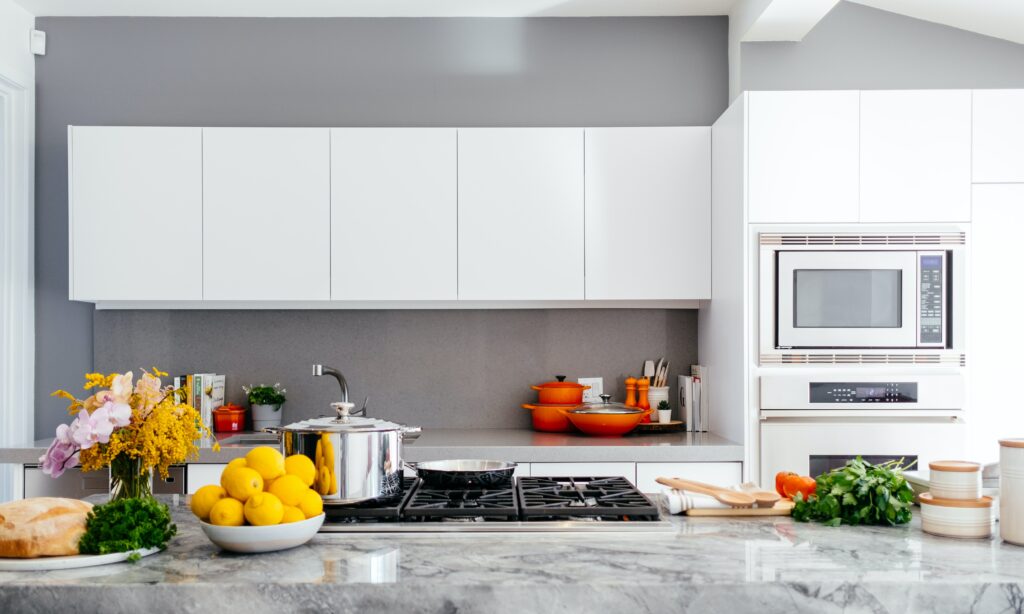
Challenges and Limitations of Smart Kitchens
Initial Cost
One of the main challenges of transitioning to a smart kitchen is the initial cost. Smart appliances can be more expensive than their conventional counterparts, making them a significant investment. However, it’s important to consider the long-term benefits and potential savings in terms of efficiency and reduced food waste. With time, the initial cost can be offset by the convenience and added value that smart appliances bring to your culinary experience.
Learning Curve
Transitioning to a smart kitchen may require a learning curve as you familiarize yourself with the functionalities and features of each appliance. Learning how to connect and control the devices, as well as understanding the full range of capabilities, can take time and patience. However, most manufacturers provide comprehensive user manuals and online resources to guide you through the process. With a bit of practice and exploration, you’ll soon become a pro at navigating your smart kitchen.
Dependence on Technology
As with any technology-driven system, there is always the risk of technical issues or malfunctions. Dependence on technology means that if something goes wrong, it may disrupt your cooking routine. Power outages, Wi-Fi connectivity issues, or software glitches can temporarily hinder your ability to use certain features of your smart kitchen. However, manufacturers are continuously improving their products and addressing these concerns to ensure a seamless user experience.
Incompatibility with Traditional Cooking Methods
While smart kitchens offer numerous benefits, they may not be suitable for every cooking style. Some home cooks prefer the hands-on approach and the tactile experience of traditional cooking methods. The transition to smart appliances may feel too automated for those who enjoy the process of manually adjusting temperatures, monitoring cooking times, and relying on their senses. It’s important to find a balance that suits your cooking preferences and ensures that your smart kitchen complements your individual style.
Smart Kitchen Security and Privacy Concerns
Data Security
Smart kitchens raise concerns about data security and privacy. As these appliances collect and store information about your cooking habits and preferences, there is a need for robust data security measures. It’s essential to choose reputable brands that prioritize data protection and encryption. Additionally, regularly updating your appliances’ software and using strong passwords can further safeguard your personal information.
Privacy Risks
The integration of smart devices in the kitchen means that data is being shared with various interconnected systems. This raises concerns about privacy, as the data collected from your smart kitchen could potentially be accessed by third parties. To mitigate these risks, it’s crucial to review each appliance’s privacy policy and understand what data is being collected and how it is being used. Additionally, familiarize yourself with the privacy settings and adjust them according to your preferences.
Minimizing Vulnerabilities
To minimize vulnerabilities in your smart kitchen, it’s important to follow best practices for cybersecurity. Regularly updating your appliances’ software, using strong and unique passwords for each device, and practicing safe internet browsing habits can help minimize the risk of cyber threats. Being proactive and vigilant when it comes to your smart kitchen’s security ensures that you can enjoy the convenience without compromising your privacy.
Protecting Personal Information
Protecting your personal information should be a top priority when using smart kitchen appliances. Be cautious when sharing personal data with third-party applications or services that integrate with your smart kitchen. Make sure the apps and services you use have a good track record when it comes to data protection. Finally, regularly review the permissions and access rights granted to each app or service to ensure they align with your privacy preferences.
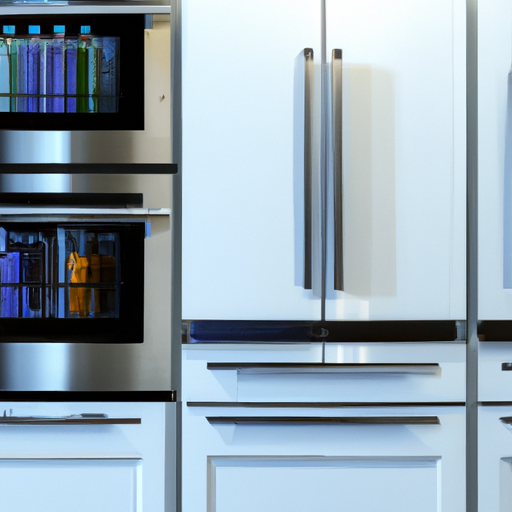
Future Trends in Smart Kitchen Technology
Artificial Intelligence and Machine Learning
The future of smart kitchen technology lies in the advancements of artificial intelligence (AI) and machine learning. These technologies will enable appliances to learn from users’ preferences and adapt to their cooking style. From personalized recipe recommendations to automated cooking processes, AI and machine learning will revolutionize how we interact with our smart kitchens, making them even more intuitive and user-friendly.
Internet of Things (IoT)
The Internet of Things (IoT) will play a significant role in the future of smart kitchens. As more devices become interconnected, the possibilities for integration and automation expand. Imagine a kitchen where your smart refrigerator communicates with your smart oven, automatically adjusting the oven’s temperature and cooking time based on the ingredients you’ve selected. The IoT will create a seamless ecosystem where every appliance works together to create a more efficient and enjoyable cooking experience.
Smart Kitchen Ecosystems
Smart kitchen ecosystems will emerge as manufacturers develop comprehensive product lines that seamlessly integrate with one another. By purchasing appliances from the same brand or ecosystem, users will benefit from a more cohesive and integrated experience. These ecosystems will not only enhance the functionality and connectivity of the appliances within but also enable cross-compatibility with other smart devices in the home, creating a truly connected living environment.
Personalized Culinary Experiences
The future of smart kitchens will focus on delivering personalized culinary experiences. From tailored recipe recommendations to customized cooking programs, smart appliances will adapt and learn from your cooking habits, preferences, and dietary restrictions. Imagine having a smart kitchen that knows your food allergies and automatically adjusts recipes to suit your needs. With personalized culinary experiences, smart kitchens will cater to individual tastes and dietary requirements like never before.
Conclusion
Embracing the revolution of smart kitchens is transforming the way we cook. With the convenience, efficiency, and health benefits they offer, it’s no wonder that more and more people are upgrading their kitchens with smart appliances. From smart refrigerators that keep track of your groceries to smart ovens that cook your meals to perfection, the possibilities are endless. While there may be challenges and considerations, the benefits of a smart kitchen far outweigh the initial costs. By building and utilizing a smart kitchen, you’re not only enhancing your culinary skills but also enjoying the benefits of a more efficient, connected, and personalized cooking experience. So, go ahead, embrace the recipe revolution, and transform the way you cook in your very own smart kitchen.
